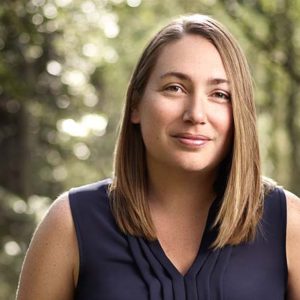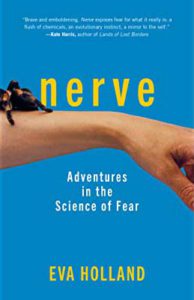“It was funny to be in a sort of a time warp, feeling like I was just working on my fourth-year thesis again, but actually, writing a book for a major publishing house.”
-Eva Holland, BA‘05
 When Eva Holland graduated from the University of King’s College with a Bachelor of Arts in 2005, she never thought she’d be spending long hours in the Killam Library ever again. But there she was years later, pulling long hours and feeling like “everything was the same, even the coffee and snacks in the atrium.” Travelling from her home in Whitehorse to Halifax, Holland used her alumni privileges to access medical science journals that helped her write the science portions of her 2020 book Nerve: A Personal Journey Through the Science of Fear.
When Eva Holland graduated from the University of King’s College with a Bachelor of Arts in 2005, she never thought she’d be spending long hours in the Killam Library ever again. But there she was years later, pulling long hours and feeling like “everything was the same, even the coffee and snacks in the atrium.” Travelling from her home in Whitehorse to Halifax, Holland used her alumni privileges to access medical science journals that helped her write the science portions of her 2020 book Nerve: A Personal Journey Through the Science of Fear.
An award-winning features writer, Holland recently joined another King’s alum, Harley Rustad, BJ ’12, for an online conversation to talk about Nerve. She told participants she had initially written a book proposal about the changing Arctic, but publishers weren’t interested because, they said, it wasn’t commercial enough. Nevertheless, they wrote back to her agent to say “Eva seems great. Please have her send us something that people are going to want to buy.”
 At the time, Holland was contending with a paralyzing fear of heights and driving, two things integral to her passion for outdoor adventure and life in northern Canada. She’d also experienced her worst fear in 2015, with the premature death of her mother. So she wrote a second book proposal, about exploring the science of fear. This time, she opened herself up as the main subject. Released in April of 2020 by Penguin in Canada and The Experiment in the United States, Nerve went on to be named to Time’s “100 Must-Read Books of 2020″—one of four Canadian titles on the list. Rustad and the online audience of MFA in Creative Nonfiction students and alumni had a long list of questions about the writing of Nerve.
At the time, Holland was contending with a paralyzing fear of heights and driving, two things integral to her passion for outdoor adventure and life in northern Canada. She’d also experienced her worst fear in 2015, with the premature death of her mother. So she wrote a second book proposal, about exploring the science of fear. This time, she opened herself up as the main subject. Released in April of 2020 by Penguin in Canada and The Experiment in the United States, Nerve went on to be named to Time’s “100 Must-Read Books of 2020″—one of four Canadian titles on the list. Rustad and the online audience of MFA in Creative Nonfiction students and alumni had a long list of questions about the writing of Nerve.
Rustad was particularly interested in the challenge of being subject and writer. Describing the book as a hybrid of science and memoir, Holland says she wrote the memoir section first, admitting at times she had to put down the pen. Transferring back and forth between memoir and science also made her nervous. Her editors, she says, helped her choose where to reveal more personal detail and where to pull back. She also hired a fact checker to review the science to make sure her interpretations were sound.
Holland welcomed the conversation with students and alumni about craft, noting she has only done one in-person event since the release.
“I’m excited, you know, to talk to MFA students about the thought process behind the decisions I made in the book. Authors don’t get to have people engage with them on that level very often.” Launching her book during a worldwide pandemic, she says, was a strange juxtaposition between writing about what everyone is talking about, fear and anxiety, but then having to side-step general questions which she couldn’t answer.
Asked if the scientific treatments she writes about have helped with her own fears, she says ‘yes,’ explaining that what began as her ‘somewhat cynical point of view’ turned into a journey of healing which Holland says made her fears manageable. Focusing now on magazine work, she hopes readers of Nerve are “left with a sense of possibility that fear can be renegotiated and doesn’t have to be so terrifying.”

